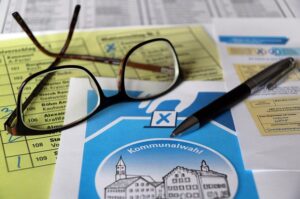Although it is not a medical diagnosis and is not listed in the DSM-5 (Diagnostic and Statistical Manual of Mental Disorders), election fatigue or election stress is a genuine experience that people have when feeling overwhelmed during the months leading up to the casting of votes for the president. The 24-hour news cycle by which the media is determined to keep us abreast of the latest breaking news, feeds the condition. Many find themselves needing to make a choice between staying informed and maintaining a sense of psychological wellbeing. Add to it, the polarizing messages on social media and we have a recipe for increasing emotional turmoil.
 According to Dr. Robert Bright, a psychiatrist from the Mayo Clinic, “It’s an experience of overwhelming anxiety that can manifest in a number of ways.” He goes on to elaborate that we may feel a tension in our necks, a stirring in our gastrointestinal systems, sleeplessness, worry and fear. These symptoms mirror anxiety, involving a sense of uncertainty about the future and a lack of control over the outcome of circumstances, in this case the vote count that will have profound effects on the future of this country, and by extension, the world.
According to Dr. Robert Bright, a psychiatrist from the Mayo Clinic, “It’s an experience of overwhelming anxiety that can manifest in a number of ways.” He goes on to elaborate that we may feel a tension in our necks, a stirring in our gastrointestinal systems, sleeplessness, worry and fear. These symptoms mirror anxiety, involving a sense of uncertainty about the future and a lack of control over the outcome of circumstances, in this case the vote count that will have profound effects on the future of this country, and by extension, the world.
In the previous decades, elections have held consequence, but never so much as in the past three campaigns. (2016, 2020 and now 2024) Regardless of which side of the aisle on which you sit, it is an ongoing concern. Misinformation and disinformation feed the lack of faith in the electoral system and contribute to contention between voters.
An edifying article in Reader’s Digest, called “Misinformation vs. Disinformation: How to Tell the Difference,” expresses it simply, “Misinformation contains content that is false, misleading, or taken out of context but without any intent to deceive, while disinformation is false or misleading content purposefully created with an intent to deceive and cause harm. It’s typically motivated by three factors: political power or influence, profit, or the desire to sow chaos and confusion.”
One way to keep from contributing to this pattern is to refrain from sharing social media posts or news stories until you have done your due diligence by vetting the source and intent. Factcheck.org is an encompassing and non-biased site to get clarity on the legitimacy of the spoken or written word in the political realm.
How can we address election fatigue and minimize its impact on us?
- Develop an awareness of when you are feeling the physiological and psychological signs.
- Find supportive people to talk to about your experience.
- Learn about the varying perspective of those in your life. Remember that opinion and values are two different things. Opinion is about your favorite flavor of ice cream, not whether only certain people have rights. We vote with our values. That should be considered a non-partisan statement. Have a heart centered conversation, truly listen, and look for common ground.
- If you note that family and friends have a different perspective than yours, such that being together evokes more stress, carefully manage your time with them.
- Remember that some beliefs are generational and that tribalism is a factor in how people vote.
- If you have the tools and skills, write about your feelings in a public forum, or privately in your journal.
- Recognize that despite what is going on in the background clamoring for your attention and seemingly wanting to drag you down, you can still enjoy the daily events of your life.
- Volunteer to get out the vote and encourage voter registration. Help people get to the polls if they need assistance.
- Take time away from the media by engaging in relaxing activities.
- Get solid sleep and nourishment.
- Avoid doom scrolling, as tempting as it might be.
- Seek therapy if needed. It is no surprise that more clients are bringing this concern into treatment.
- Listen to One Small Step on NPR which matches people of different political perspectives for civil conversation. If you are so inclined, sign up to participate.
Remember that after the election, we still need to live in harmony as much as possible with folks who have cast their vote in a way that is different from our own.
